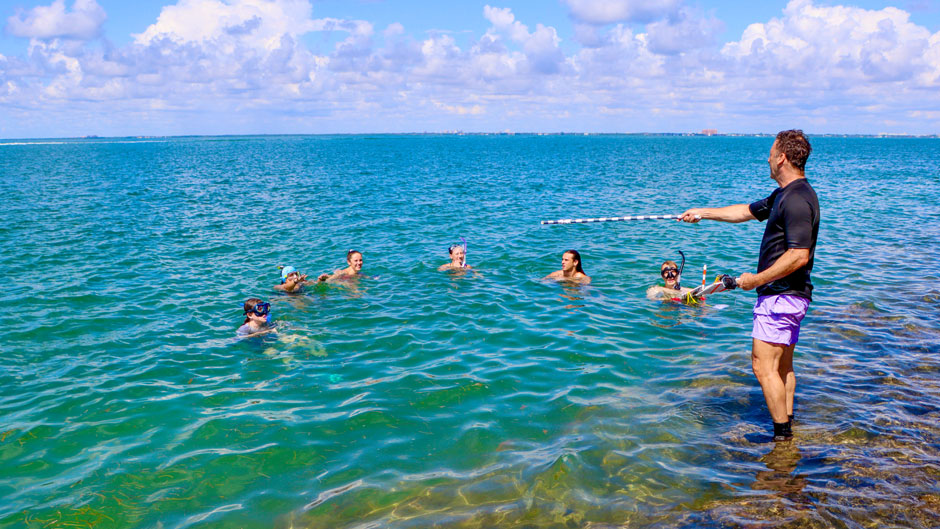Sequencing the DNA of mussels is not something that Sthefano Orellana expected to learn during his first four years of college.
But Orellana is now well-versed in the practice. It is one piece of a research project to determine whether certain mussels are more equipped to weather waves than others. And he is spending hours in the lab this fall honing these techniques, and others, as part of Saltwater Semester, a new hands-on program offered to undergraduates studying marine science at the University of Miami Rosenstiel School of Marine, Atmospheric and Earth Science.
“I’ve been passionate about marine biology since I was 6 years old,” said Orellana, an Ecuador native who wants to become a marine biologist. “Saltwater Semester has given me lab and field experience, and introduced us to processes like collecting samples, as well as using software to analyze data and to facilitate paper writing with that data. I’m getting a lot of knowledge and experience that will be very useful for the future.”
Now in its second year, Saltwater Semester is an intensive research-based program taught by faculty members in the Department of Marine Biology and Ecology. In the program, students take four classes for about three weeks each. They spend almost the entire day with a faculty member and their graduate students, learning in nature, as well as in the lab. For example, students on the coral track recently spent the morning at Bill Baggs Cape Florida State Park on Key Biscayne learning how to survey the health and variety of coral reefs with associate professor Diego Lirman.
“The semester is designed to give younger students the opportunity to study at the Rosenstiel campus during their undergraduate years, which is uncommon unless students work in a lab,” said Liza Merly, senior lecturer and director of the undergraduate program in marine biology and ecology.
As part of the program, students also take a one-credit professional development course, where they attend presentations from graduate students and Rosenstiel faculty members about ongoing research and get firsthand advice on how to prepare for graduate school or careers.
“It’s almost like a study abroad program at Rosenstiel,” Merly added. “What’s unique about this is not only are they immersed in a research environment, but they are taking one class at a time and working with professors and their graduate students day-in, day-out. So they are getting a good understanding of how science is done, which is really good preparation for graduate school.”
Offered during the fall, the program is geared toward junior or senior marine biology and ecology majors but is open to all students earning an undergraduate degree at the Rosenstiel School. Students can choose one of two tracks—one focused on the health and conservation of corals or another focused on the physiology, behavior, and genomics of fish and other marine organisms.
Professor Danielle McDonald spent the first three days of this semester introducing the program’s 10 students to some research and sampling methods with professor Lynne Fieber, senior lecturer Evan D’Alessandro, and graduate teaching assistant Emma Pontes at the Rosenstiel School’s Research Station at Broad Key, just north of the Florida Keys. As one of the faculty members on the physiology, behavior, and genomics track, McDonald said this year her students will be investigating the impacts of low oxygen and variable salinity in the water on sheepshead minnows.
“We also look at how fish see, hear, and smell and we do experiments to test those things,” she said. “Students read papers about previous work on the topic and think about how to design an experiment to test one of those aspects. Through the process, students learn how to do behavioral experiments better, and we are there to guide them every step of the way.”
Her colleagues, professors Doug Crawford and Marjorie Oleksiak, offered hands-on research courses for the past several years and helped envision the Saltwater Semester, which debuted last fall. At the end of the course, students often submit a team research paper for publication and Crawford said the work from last fall’s class was published recently.
“These are not lab experiments where the students know what the results will be. So, often things don’t work out, and it’s figuring out why they don’t work that really enhances their understanding of science,” Crawford said.
The experience of attending a morning lecture about coral conservation and then going snorkeling to restore coral colonies by outplanting new ones with Lirman, was one that senior Maggie Farley-Stevenson savored. While the marine biology and ecology major knew she wanted to go to graduate school, Saltwater Semester solidified her interest and inspired her to study corals. She also felt fortunate to spend several hours a day with four of the University’s coral experts—Lirman, professors Andrew Baker, Chris Langdon, and Nikki Traylor-Knowles—along with their graduate students.
“I feel like I learned more in that semester than in some of the other classes I have taken in college,” said Farley-Stevenson, who attended last fall. “It was so one-on-one with professors, and we had such small class sizes that if you had any question you could freely ask it. If you want to learn more about corals or genomics, it’s an amazing experience.”
Junior Caroline Kevin is currently in the Saltwater Semester program and said starting classes by staying overnight at Broad Key—and then being able to identify fish and coral species while snorkeling with faculty members and graduate students—was one of her favorite experiences.
“Being able to see how all the ecosystems we will be studying were interacting in the ocean was a really cool start to the semester,” she said. “It was the perfect introduction into what we were going to be learning.”

